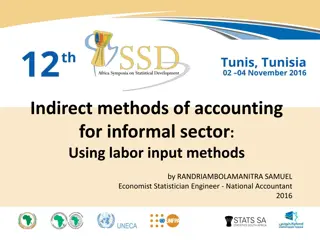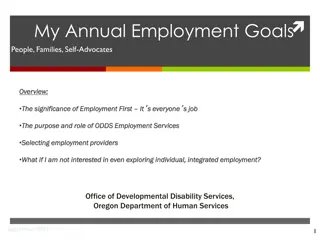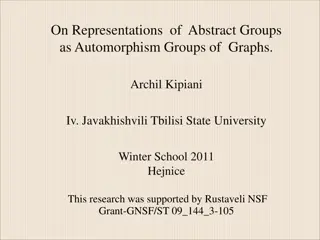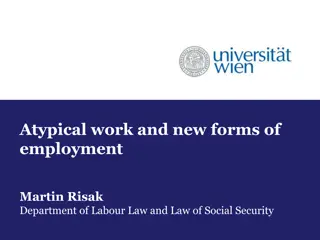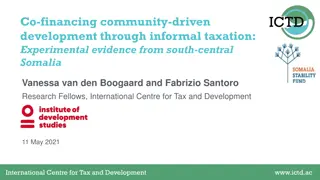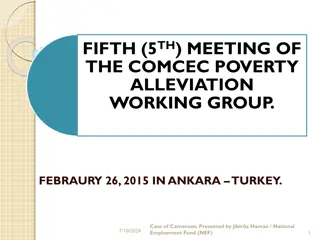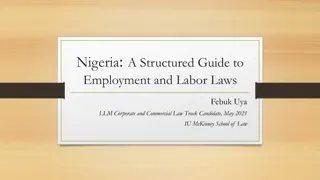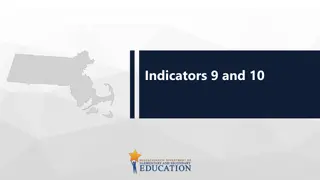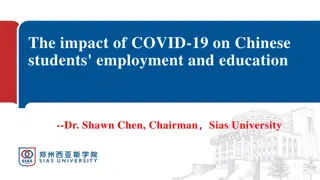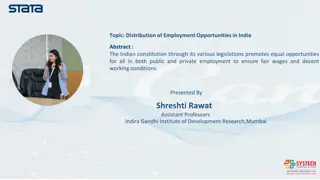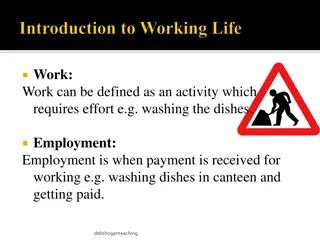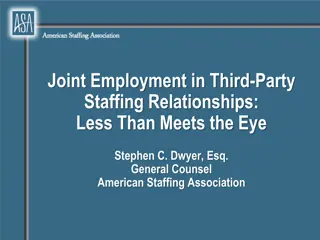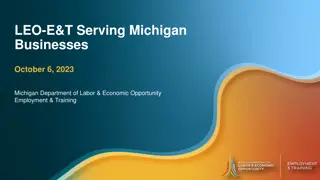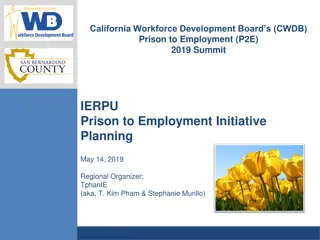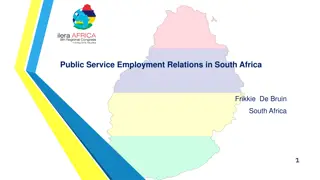Understanding the Informal Employment Landscape: Special Groups and Policy Demands
Explore the importance of statistics for domestic workers, home-based workers, street vendors, and waste pickers. Recognize their significant contributions to the economy and society. Delve into common core needs and policy demands for these workers to ensure fair treatment and protection in the workforce.
Download Presentation

Please find below an Image/Link to download the presentation.
The content on the website is provided AS IS for your information and personal use only. It may not be sold, licensed, or shared on other websites without obtaining consent from the author. Download presentation by click this link. If you encounter any issues during the download, it is possible that the publisher has removed the file from their server.
E N D
Presentation Transcript
REGIONAL COURSE ON INFORMAL EMPLOYMENT STATISTICS SESSION 1.5 SPECIAL GROUPS OF INFORMAL WORKERS 16-20 OCTOBER 2017
DOMESTIC WORKERS HOME-BASED WORKERS - STREET VENDORS AND MARKET TRADERS WASTE PICKERS Characteristics old/traditional occupations largely informal employ large numbers of women operate without government regulations and protection largely invisible
WHY IS IT IMPORTANT TO HAVE STATISTICS ON THESE GROUPS OF WORKERS? A significant part of the labour force These jobs not only provide livelihood for the poor but also goods and services for poor households often at a lower cost and greater availability Any national policy on economic development and job creation must focus on improving the economic and social situation of these workers in these jobs in addition to developing programmes in new sectors of the economy
SIGNIFICANCE: FOUR GROUPS OF URBAN INFORMAL WORKERS - INDIA 2011-12 % of Urban Employment Total Male % of Urban Informal Employment Total Male Female Female Domestic Workers 5 2 13 6 3 17 Home-Based Workers 14 10 32 17 12 40 Street Vendors 4 4 3 5 5 3 Waste Pickers 1 .5 2 1 1 3 ALL FOUR 23 17 49 29 21 62
COMMON CORE NEEDS AND POLICY DEMANDS FOR THESE GROUPS OF WORKERS Recognition as workers who make a valuable contribution to the economy and society as part of the economically active population The right not to be subjected to punitive regulations, policies, or practices The right to enjoy specific promotional and protective measures, including protection against exploitation by intermediaries. Here we look first at some of the general measures in the ILC 2015 Recommendation on the Transition from the Informal to the Formal Economy(the points above) and then at measures specific to the categories of workers of informal workers of concern to WIEGO.
SPECIFIC DEMANDS FOR POLICY Home-based workers protection from being subjected to poor quality raw materials, arbitrary cancellation of work orders, arbitrary rejection of goods, or delayed payments (sub-contracted) the right to basic infrastructure services water, electricity, sanitation at their homes, which are their workplaces (all) access to markets for their goods and services the right to fair prices in markets (self-employed), and fair piece- rates (sub-contracted
SPECIFIC DEMANDS FOR POLICY-- continued Street Vendors and Market Traders freedom from harassment, confiscation of goods, evictions, arbitrary warrants and convictions, arbitrary relocations, unofficial payments and/or bribes freedom from fear of authorities and mafia elements freedom from exploitation by intermediaries who take high fees the right to have natural markets of street vendors recognized and built into urban zoning and land allocation plans the right to vend in public spaces under fair and reasonable conditions (which balance competing rights of different users of public spaces) and to maintain natural markets the right to fair and transparent allocation of permits and licenses
SPECIFIC DEMANDS FOR POLICY-- continued Waste pickers freedom from harassment, bribes, and evictions by city authorities the right to access recyclable waste without restrictions access to markets provision of infrastructure the right of their organizations to bid for solid waste management contracts
SPECIFIC DEMANDS FOR POLICY--continued Domestic Workers the right to a living wage and working conditions such as time off and leave, overtime pay, sick leave, health insurance, and pensions freedom from harassment or abuse by recruiters or employers freedom from exploitation by agencies and intermediaries implementation of the Domestic Workers Convention and accompanying Recommendations as a minimum set of conditions in every country
STATISTICAL CHALLENGES Location of work makes them difficult to capture Data on multiple variables are required for the identification of some of the categories Classification of industries and occupations either not sufficiently detailed or they are not used See:Vanek, Chen and Raveendran. A Guide to Obtaining Data on Types of Informal Workers in Official Statistics. 2012. WIEGO Statistical Brief No.8.
Typical Options for the Question on Place of work No fixed work place Work place located in: Dwellings: Own dwelling Structure attached to own dwelling Open area adjacent to own dwelling/ Detached structure adjacent to own dwelling Other permanent structures Own enterprise/office/shop but away from own dwelling Employer s dwelling unit Employer s enterprise/office/shop but outside employer s dwelling Built markets Open spaces Street with fixed location Street mobile Construction site Others Agricultural area
HOME-BASED WORKERS AND HOMEWORKERS Home-based workers: the category of nonagricultural workers who perform remunerative work (for pay or profit) in their own homes or adjacent grounds or premises Two types of home-based workers self-employed, working independently in their own homes homeworkers --wage workers or sub-contracted workers who work in their own homes for a firm or its contractors Note: Home-based workers is a general term that refers to both categories.
HOME-BASED WORKERS AND HOMEWORKERS-- continued Self-employed, work independently at their own homes take entrepreneurial risks (for example, make capital investments, obtain loans, buy equipment and sell their finished goods) Include employers (with hired workers), own account operators (without hired workers), and contributing unpaid family workers Wage workers or sub-contracted workers who work in their own homes for a firm or its contractors. Sub-contracted homeworkers provide their own workspace and are not directly supervised by their employer, so are sometimes categorized as independent self-employed; however they are dependent on the contractor for work orders, raw material and sale of finished goods, so are sometimes classified as dependent wage workers.
HOME-BASED WORKERS AND HOMEWORKERS-continued Classifying these workers is a major issue in revision of International Classification of Status in Employment, i.e. capturing workers who occupy an intermediate status between fully independent self-employed and fully dependent wage employed requires a new category dependent contractors. Data on place of work, activity status, economic activity, ownership of unit and access to market (who determines price) are required for the identification of independent home-based workers as distinct from homeworkers
STREET VENDORS AND MARKET TRADERS Street vendor -- those who sell goods in public spaces other than a store, and those who sell services in public spaces, such as: hairdressers or barbers; shoe shiners and repairers; and bicycle, motorcycle, car, or truck mechanics. Street-- interpreted broadly to include vendors who sell in non-private spaces, including sidewalks, parks, alleyways and other open-air locations; around construction sites, sports stadiums, transport junctions; and on public transport Market traders are those who sell goods or provide services in built markets on publicly or privately owned land
STREET VENDORS AND MARKET TRADERS-Compilation methods Persons vending goods at public places are usually identified by their occupational classification Persons selling services in public places can be identified by using occupational classification or industrial classification combined with place of work Use of either classification usually would need to be combined with place of work codes
WASTE PICKERS Waste pickers - those who do the primary collecting and sorting of waste. extract and reclaim re-usable and recyclable materials from mixed types of waste that others have cast aside Most countries do not have a specific code for identifying waste pickers either in their occupation or industry classification The nearest industry or occupation codes relate to garbage collection, transportation and disposal Waste pickers
DOMESTIC WORKERS Domestic workers are unique as many are neither employed by an enterprise nor self-employed but by households but there are different types of domestic workers: - live-in domestic employee - domestic employee of a household residing elsewhere - domestic worker employed by an agency - self-employed domestic service provider e.g. taking in laundry Of the 4 categories of informal workers considered here, domestic workers are the only one routinely identified in national statistics still they are often under-enumerated and misclassified They can be identified by using a combination of national occupational codes, place of work and informal work status
DEMAND FOR STATISTICS BY WORKER GROUPS AND WIEGO PUBLICATIONS International Domestic Worker Network (IDWN), the Self- Employed Women s Association (SEWA) Waste-picker groups request statistics in accessible formats International Labour Organization and WIEGO. 2013. Women and Men in the Informal Economy: A Statistical Picture, 2nd Edition. ILO ch. 4. Tokman, Victor. 2010. Statistics on Domestic Workers in Latin America WIEGO Statistical Brief No. 1 Dias, Sonia. 2011.Statistics on Waste Pickers in Brazil. WIEGO Statistical Brief No. 2
DEMAND FOR STATISTICS BY WORKER GROUPS:WIEGO PUBLICATIONS ON HOME-BASED WORKERS HomeNet South Asia requester and collaborating group Akhtar, Sajjad and Joann Vanek. 2013.Home-Based Workers in Pakistan: Statistics and Trends.WIEGO Statistical Brief No. 9 Raveendran, Govindan, Ratna M. Sudarshan and Joann Vanek. 2013. Home-Based Workers in India: Statistics and Trends WIEGO Statistical Brief No. 10 Raveendran, Govindan and Joann Vanek. 2013. Statistics on Home-Based Workers in Nepal .WIEGO Statistical Brief No. 11 Mahmud, Simeen. 2014. Home-Based Workers in Bangladesh: Statistics and Trends. WIEGO Statistical Brief No. 12
DEMAND FOR STATISTICS BY WORKERS GROUPS: WIEGO PUBLICATIONS ON STREET VENDORS AND MARKET TRADERS WIEGO Focal City Project, Lima Peru - requester and collaborator Linares Allaga, Lissette. 2017. Statistics on Street Vendors and Market Traders in Metropolitan Lima and Urban Peru. WIEGO Statistical Brief no.2.
MEMBER-BASED ORGANIZATIONS OF INFORMAL WORKERS IN ASIA Bangladesh *Labour at Informal Economy (LIE) Cambodia Artisans Association of Cambodia -- HomeNet Cambodia (AAC) Independent Democracy of Informal Economy Associations (IDEA) Hong Kong, China *International Domestic Workers Federation Federation of Asia Domestic Workers Unions (FADWU) India Alliance of Indian Wastepickers (AIW) Hasiru Dala Waste Picking Cooperative *Homenet South Asia *Kagad Kach Patra Kashtakari Panchayat (KKPKP) Karnataka Domestic Workers Union *National Association of Street Vendors of India (NASVI)
MEMBER-BASED ORGANIZATIONS OF INFORMAL WORKERS IN ASIA (continued) India (cont) Pune City Domestic Workers Organization Safai Sena Waste Pickers Association *Self-Employed Women's Association (SEWA) *SEWA Bharat, Self Employed Women's Association (all India) Solid Waste Collection and Handling (SWaCH) Tamil Nadu Domestic Worker Union Indonesia Federasi Konstruksi, Umum dan Informal (Federation of Construction, Informal & General Worker, FKUI) Himpunan Wanita Pekerja Rumahan Indonesia, Association of the Indonesian Women Homeworkers (HWPRI) HomeNet Indonesia National Network for Domestic Workers Advocacy (Jala PRT) Tunas Mulia Domestic Workers Union-Indonesia
MEMBER-BASED ORGANIZATIONS OF INFORMAL WORKERS IN ASIA (continued) South Korea Korean Street Vendors Confederation (KOSC) National House Managers Cooperative Nepal *General Federation of Nepalese Trade Unions (GEFONT) Home-based Workers Union based on Bamboo Work Home-based Workers Union Nepal Nepal Independent Domestic Workers Union (NIDWU) Nepal Street Traders Union (NEST) Pakistan Home Based Women Workers Federation (HBWWF) Home-Based Women Bangle Workers Union HomeNet Pakistan
MEMBER-BASED ORGANIZATIONS OF INFORMAL WORKERS IN ASIA (continued) Philippines *Pambansang Kalipunan ng mga Manggagawang Impormal sa Pilipinas or National Network of Informal Workers in the Philippines (PATAMABA) Thailand *Homenet South East Asia *Homenet Thailand Network of Thai Domestic Workers


